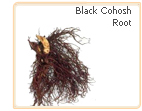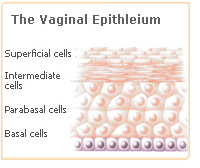Menopause Symptoms and Black Cohosh
Black Cohosh is an herb that has proven to curb some of the most well known symptoms of menopause. These symptoms include hot flashes and vaginal dryness. Placebo based studies have proven the effectiveness of Black Cohosh in curbing the severity of hot flashes. This effect has been monitored on the Kupperman Index, which measures the severity and frequency of hot flashes.
Research on the use of Black Cohosh in regards vaginal dryness has been more mixed however, with much of the research proving contradictory. Some studies have shown it has a positive effect on the vaginal changes caused by menopause. Other studies however have shown it to have no effect on this menopausal symptom.
 In the treatment of menopausal symptoms Black Cohosh functions an estrogenic herb. The perennial root has this name because it replaces lost hormones in the body with plant like hormones. Such a function is sought after by menopausal women, because symptoms of menopause occur due to an imbalance in the body's natural hormone levels. As a natural alternative to Hormone Replacement Therapy (HRT), the effectiveness of Black Cohosh has come into question.
In the treatment of menopausal symptoms Black Cohosh functions an estrogenic herb. The perennial root has this name because it replaces lost hormones in the body with plant like hormones. Such a function is sought after by menopausal women, because symptoms of menopause occur due to an imbalance in the body's natural hormone levels. As a natural alternative to Hormone Replacement Therapy (HRT), the effectiveness of Black Cohosh has come into question.
In regards hot flashes however placebo based studies have shown the herb reduced the presence of hot flashes in a sample group of 80 women. Some were given an extract of the herb (Remifemin twice daily), while others were given a placebo. Hot flashes in the Black Cohosh group decreased from 4.9 to 0.7. In the placebo group, hot flashes decreased from 5.1 to 3.1. The Kupperman index and the Hamilton anxiety scale were used over a period of 12 weeks in order to collate these results.
 Similarly to hot flashes, changes in the vaginal structure and tissue amongst menopausal women are caused by a hormone imbalance. One of the results of this is the occurrence of vaginal dryness. This is caused by decreased levels of estrogen, which directly affects the vaginal epithelium or vaginal tissue. One study trial has shown that menopausal women consuming Black Cohosh, experienced positive changes in vaginal epithelium. Another study however found that menopausal women taking Black Cohosh experienced no changes in vaginal epithelium.
Similarly to hot flashes, changes in the vaginal structure and tissue amongst menopausal women are caused by a hormone imbalance. One of the results of this is the occurrence of vaginal dryness. This is caused by decreased levels of estrogen, which directly affects the vaginal epithelium or vaginal tissue. One study trial has shown that menopausal women consuming Black Cohosh, experienced positive changes in vaginal epithelium. Another study however found that menopausal women taking Black Cohosh experienced no changes in vaginal epithelium.
Because of such findings, attitudes towards the actual effectiveness of Black Cohosh in regards treating menopause is dubious at best. Fluctuations in research results in the usefulness of Black Cohosh in regards treating menopause symptoms are due to the length and inflexibility of the studies. Such varying results are compounded by the side effects of consuming Black Cohosh. The herb has been known to increase the chances of postmenopausal women contracting diseases, if taken over long periods of time. Such results would not show up in shorter studies (6 months or less). As an estrogenic herb Black Cohosh could also be capable of have a detrimental effect on uterine and breast tissue.
Source:
JAMA - The Journal of the American Medical Association
Arch Intern Med. 2006;166:1453-1465.



































